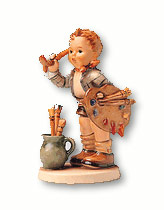
|
Collecting: All For Fun or Obsessive Trap?
|
 Thanks to eBay, collecting is not only cool but seen as a fun way to invest. Thanks to eBay, collecting is not only cool but seen as a fun way to invest.It was always OK to collect stamps, coins and dolls, and even mass-produced Beanie Babies now are hunted down like ancient artifacts. But toilet paper (medicated, mini, themed versions)? Barbed wire (various styles)? ATM receipts (from famous landmarks)? ``The ATM slip that set me off was from the White House,'' said Nina Skriloff, who also collects refrigerator magnets, Art Deco picture frames, eyeglasses and tiny tubes of toothpaste from hotels. ``People think you're insane, and I am, but by the time you tell them why you want it, they help you.'' Skriloff and millions like her know that what they collect may never be worth any money, and for the true collector the fun is in the hunt. But the Internet, which enables people to trade across borders, is changing all that. Look at Beanie Babies, Pokemon, and even the new U.S. state quarters. As long as there is a buzz that makes anything ''hot,'' it can sell for several times its original price. This applies to jewels all the way down to junk, helping turn perhaps half of all Americans into collectors of some sort. Illusory' As Investments``Many collectors justify them as investments but usually that's illusory,'' said Russell Belk, a marketing professor at the University of Utah in Salt Lake City who has done studies of collecting. ``Most don't recoup their costs. It's something that people would obviously like to make socially acceptable to others'' by calling their hobby an investment, he said.  While people have collected items from time immemorial, hobbyists emerged after the Second World War when U.S. soldiers returned from Europe with Hummel figurines and other souvenirs, said collectibles expert Terry Kovel. Interest grew as books on collectibles appeared and trading newspapers created a secondary market for hobbyists. Clubs were formed. While people have collected items from time immemorial, hobbyists emerged after the Second World War when U.S. soldiers returned from Europe with Hummel figurines and other souvenirs, said collectibles expert Terry Kovel. Interest grew as books on collectibles appeared and trading newspapers created a secondary market for hobbyists. Clubs were formed.
Later generations, weaned on collecting, want memorabilia from their own childhoods. Perhaps a ``collector gene'' spurs their instinct to gather, they say. Thanks to the sustained U.S. economic boom, Baby Boomers can largely afford their dream object and find it easily on the Internet, if not at flea markets and dealers. ``There's more prestige to collecting now. It's easier,'' said Kovel, who, with her husband Ralph, publishes books and newsletters on collectibles. ``When we started in the 1950s people thought you were crazy if you collected bottles, costume jewelry. It was really considered very strange. It was OK if you inherited old furniture and had to buy some stuff to go with it, but otherwise it wasn't cool.'' Always Been Squirrelly PeopleAmy Friedman, a Washington writer, said, ``I think there's always been these squirrelly people but they've always been well hidden. And now with the Internet these peculiar foibles are seeing the light of day.'' Collecting usually begins as an innocent, low-cost pastime. You stumble upon an object or two that captures your fancy and you decide to find more. The object may be related to your neighborhood or occupation or evoke childhood memories. What drives many collectors, Belk said, is ``a sense of accomplishment, competence, mastery within a small sphere, a self-defined area of collecting. Because we've narrowed it down, there's a greater chance of success (measured) against some self-imposed standard.'' Actor Ben Chau theorizes that comic books attract computer geeks and graphic designers. ``It's a very intellectual thing. They use big words, it's a very visual medium.'' An avid comic book collector in his college days, Chau gave up the chase because it was too costly and taking up too much space. Racial and cultural factors may influence what is collected, Belk said. For example, an African American may collect racist memorabilia to disempower those with racist attitudes. Income also determines whether people collect Old Master paintings or Bradford plates, for instance. But Belk has not found a correlation between personality and the kind of item collected. What experts do agree on is that the urge to collect is dangerous when it becomes obsessive. In one case, a man with good credit at a major auction house bought just about every item at a major sale but could not pay up. And Belk knows of a reformed drug addict and alcoholic who became a Mickey Mouse addict and spent his rent money on his hobby. Death is the ultimate toll. In 1947, the brothers Langley and Homer Collyer were found dead in their fashionable New York brownstone mansion among 12 tons of newspapers, broken pianos, toys, filthy rugs, auto parts, tattered clothing, 350 rubber tires, old bottles and the remains of meals. Langley apparently starved to death and Homer was found 19 days later buried under their trash, which police guessed had toppled on him. But most collectors are not willing to pay such a high price for their treasure, even if it is something ``to die for.'' Source: Reuters What fuels your obssession? Do you have the "collecting gene"? Hop on over to RTM's Toy Buzz forum and let us know what you think. [Updated 3/30/2000]
  
|









